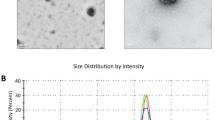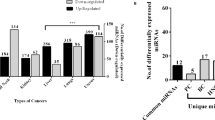Abstract
MicroRNAs (miRNAs) are small non-coding RNA molecules that function as negative regulators of gene expression. Expression analysis of miRNAs can reflect the developmental lineage and differentiation state of the tumor. Thus, the miRNA profiles could play essential roles in gallbladder cancer (GBC). However, their role as novel biomarkers for the diagnosis of GBC is unclear yet. We assessed here for the first time whole-genome miRNA expression in peripheral blood samples of 40 GBC patients using microRNA microarray. We identified 11 miRNAs, which are significantly dysregulated in GBC patients in comparison to 40 healthy controls. Among these, the expression of let-7a, miR-21, miR-187, miR-143, miR-202, and miR-335 are in agreement with those measured by real-time PCR (p < 0.05). Furthermore, dysregulated miR-187, miR-143, and miR-202 demonstrate a significant correlation with clinicopathologic features (p < 0.05). Our results suggest a possible pathological relationship between the differential expression of miRNA in peripheral blood and GBC, and these dysregulated miRNAs could be novel tumor biomarkers for early detection of GBC.
Similar content being viewed by others
References
Dutta U. Gallbladder cancer: can newer insights improve the outcome? J Gastroenterol Hepatol. 2012;27(4):642–53.
Jemal A, Siegel R, Ward E, et al. Cancer statistics, 2009. CA Cancer J Clin. 2009;59(4):225–49.
Calin GA, Croce CM. MicroRNA signatures in human cancers. Nat Rev Cancer. 2006;6(11):857–66.
Su M, Zhao X. Dignostic value of detection of CA19-9,CEA,AFP and CA125in gallbladder carcinoma patients. Med J PAPF. 2008;9(10):906–8.
Wang F, Zheng Z, Guo J, et al. Correlation and quantitation of microRNA aberrant expression in tissues and sera from patients with breast tumor. Gynecol Oncol. 2010;119(3):586–93.
Gilad S, Meiri E, Yogev Y, et al. Serum microRNAs are promising novel biomarkers. Plos One. 2008;3(9):3138–45.
Huang Y, Shen XJ, Zou Q, et al. Biological functions of microRNAs: a review. J Physiol Biochem. 2011;67(1):129–39.
Chan SH, Wu CW, Li AF, et al. mir-21 microRNA expression in human gastric carcinomas and its clinical association. Anticancer Res. 2008;28(2):907–11.
Michael MZ, O’Connor SM, Van Holst Pellekaan NG, et al. Reduced accumulation of specific microRNAs in colorectal neoplasia. Mol Cancer Res. 2003;1(12):882–91.
Shell R, Park SM, Radjabi AR, et al. Let-7 expression defines two differentiation stages of cancers. Proc Natl Acad Sci U S A. 2007;104(27):11400–5.
Yu F, Yao H, Zhu P, et al. Let-6 regulates self renewal and tumorigenicity of breast cancer cells. Cell. 2007;131(6):1109–23.
Szafranska AE, Davision TS, John J, et al. MicroRNA expression alterations are linked to tumorigenesis and non-neoplastic processes in pancreatic ductal adenocarcinoma. Oncogene. 2007;28(26):4442–52.
Zhou J, Yu L, Gao X, et al. Plasma microRNA panel to diagnose hepatitis B virus-related hepatocellular cancinoma. J Clin Oncol. 2011;29(36):4781–8.
Chao A, Lin CY, Lee YS, et al. Regulation of ovarian cancer progression by microRNa-187 through targeting disabled homolog-2. Oncogene. 2011;10(7):269–73.
Song T, Zhang X, Wang C, et al. Expression of miR-143 reduces growth and migration of human bladder carcinoma cells by targeting cyclooxygenase-2. Asian Pac J Cancer Prev. 2011;12(4):929–33.
Huang HY, Cheng YY, Liao WC, et al. SoX4 transcriptionally regulates multipleSEMA3/plexin family members and promotes tumor growth in pancreatic cancer. Plos One. 2012;7(12):48637–742.
Zu Y, Ban J, Xia Z, et al. Genetic variation in a miR-335 binding site in BIRC5 alters susceptibility to lung cancer in Chinese Han population. Biochem Biophys Res Commun. 2013;430(2):529–34.
Hu Y, Ou Y, Wu K, et al. miR-143 inhibits the metastasis of pancreatic cancer and an associated signaling pathway. Tumor Biol. 2012;33(6):1863–70.
Koberle V, Kronenberger B, Pleli T, et al. Serum microRNA-1 and microRNA-122 are prognostic markers in patients with hepatocellular carcinoma. Eur J Cancer. 2013;49(16):3442–9.
Ma Y, Zhang P, Wang F, et al. Mir-150 as a potential biomarker associated with prognosis and therapeutic outcome in colorectal cancer. Gut. 2012;61(10):1447–53.
Acknowledgments
The authors thank all the people and patients who had participated in this study.
Conflicts of interest
None
Author information
Authors and Affiliations
Corresponding author
Rights and permissions
About this article
Cite this article
Li, G., Pu, Y. MicroRNA signatures in total peripheral blood of gallbladder cancer patients. Tumor Biol. 36, 6985–6990 (2015). https://doi.org/10.1007/s13277-015-3412-4
Received:
Accepted:
Published:
Issue Date:
DOI: https://doi.org/10.1007/s13277-015-3412-4




